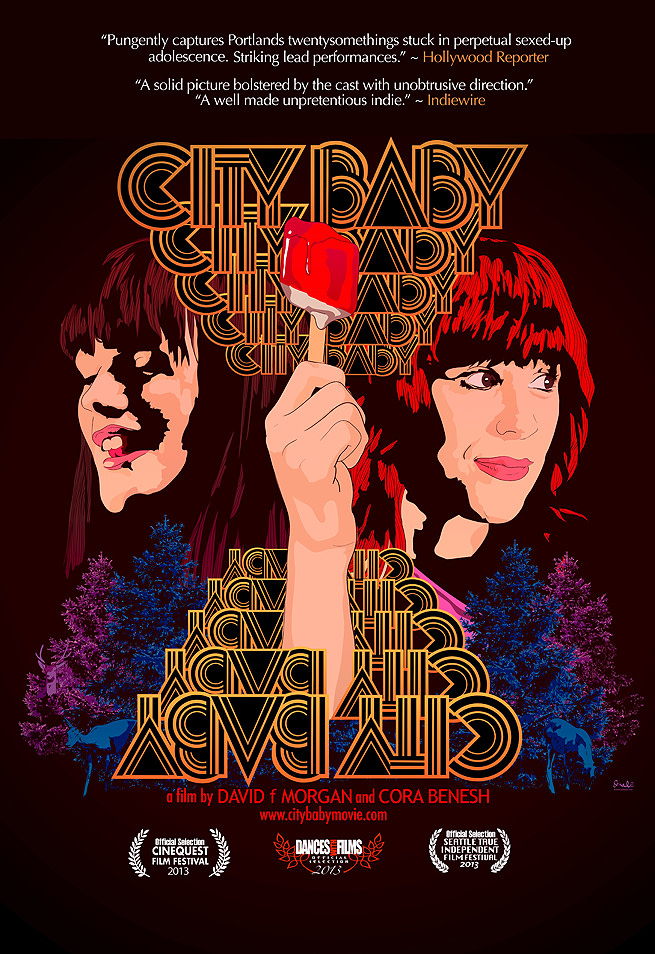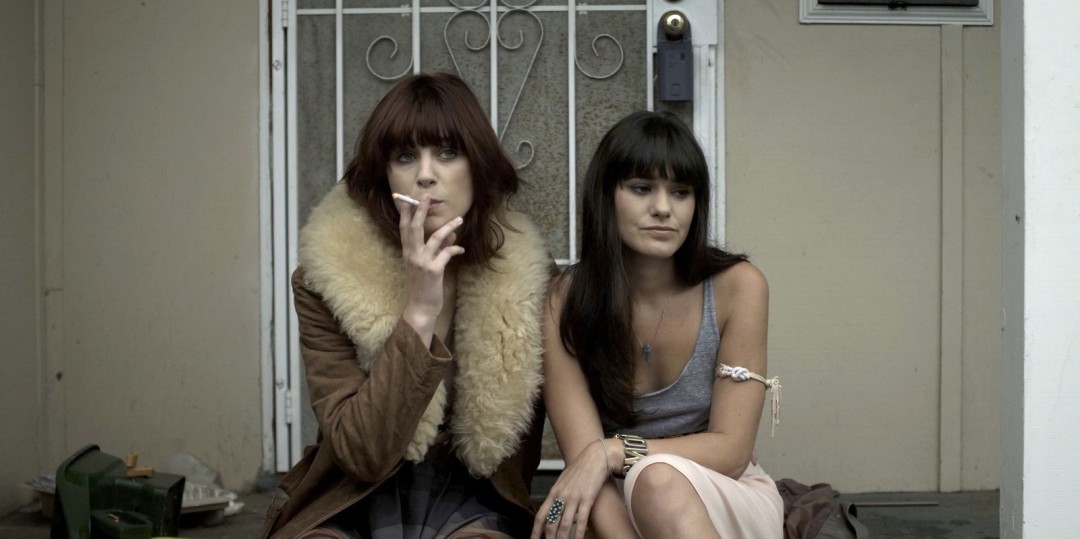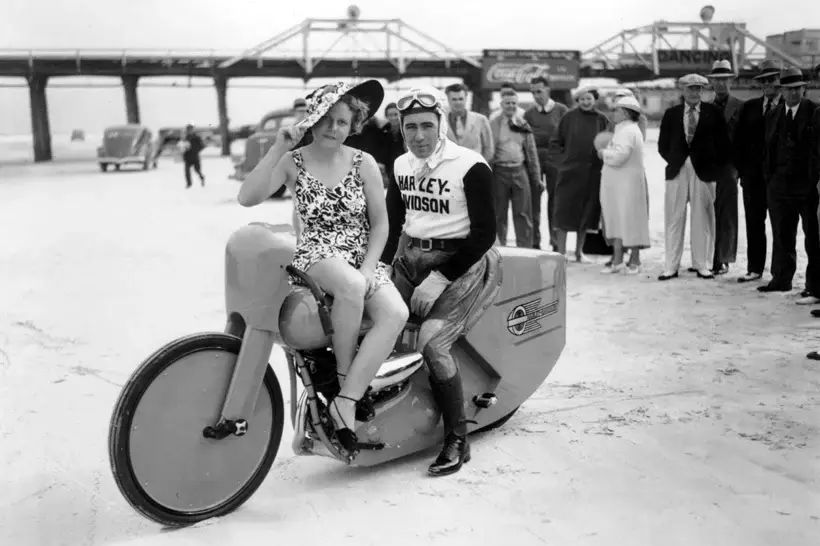Q&A: David Morgan & Cora Benesh from 'City Baby'

The Portland-centric film City Baby represents David Morgan (writer/director) and Cora Benesh’s (writer/cctress) crash course in indie filmmaking. It languidly taps into the urban, hipster landscape and cracks it open with characters who are selfish, lazy, and lost—all symptoms of battling one's way through their 20s.
The film follows Cloey (Benesh), a pretty 20-something in the midst of a crisis of self and city—a stew of first-world problems, delayed adulthood, and that special brand of Northwest boredom. Along the way, the film delves into issues of class, relationships, and ambitions. It's like watching Girls on downers.
Concert sets by STRFKR, Glass Candy, a Stephen Malkmus cameo, a soundtrack of local music (Chromatics, Helio Sequence), round out the tribe of Portlanders who got this thing off the ground. And hey! Is that Daniel Baldwin? Of course it is.
In our interview, the duo talk about finding your way, the beauty of escape, the necessity of collaboration, the Boogie Nights template, and why Portlanders may not like this film, all while issuing a sincere apology to everyone inevitably used and abused during the filmmaking process. City Baby has its Portland premiere at Cinema 21 on Thursday, May 23 at 7:30.
Culturephile: This is your first film. How did it come about?
Benesh: I studied documentary filmmaking in college. I was interested in filmmaking from that social change perspective. I started working in community access television to eventually work on documentaries. It was hard to find a job, so I started crewing on movies and commercials. I got back into acting and commercial modeling. A few years later, I met David. He said he wanted to make a movie about kids in Portland, a coming-of-age story that moves in and out of the music industry. I couldn’t believe that movie hadn’t been made yet. So, we started working together on it.
City Baby is filled with mid-20s angst and is about moving outside of your comfort zone. That seems pretty universal, but definitely palpable in Portland.
Morgan: Part of the movie is all about getting out of your hometown. That could be Oregon City getting to Portland, or from Portland to New York. I’m a firm believer in leaving your comfort zone. Soon as I graduated from college in Alabama, I was gonna go to Seattle because it was cool, but I ran out of money in Portland. The day I graduated from college, I had an interview with Hormel in Atlanta. They showed me where I would be a manager—in the bacon assembly section. I told them I’d take it. The next day I went back to Alabama and decided I needed to get the hell out. I drove to Portland with a friend and we got crappy jobs. That was back when Portland sucked, like ’95 there was nothing here. Now, this is Portland’s heyday.
I opened a sushi bar, Masu, in the Pearl. My partner bought me out, and I took the money and put it into the Tube [a metal bar in Old Town]. My buddy Mikey and I bought it, and it became this hipster mecca. Every time I was there everyone was talking about leaving—to NYC or LA. That’s a big theme in Portland, everyone’s always thinking about getting out of here.
I met Cora at the river,. We started talking about film, and we started writing this coming of age story set in Portland. The themes were all about leaving your comfort zone, being scared to do that and being the biggest, best person in your comfort zone and then leaving, not being that any longer. So, the characters in the film, Cloey and Paige, are little queens of their domain, they’re kinda poor, though Cloey has daddy money. They want to go to NYC.
Which goes back to this "escape from Portland" vibe.
Benesh: There is this “wanting to get out of Portland,” but there is also this general young person‘s feeling of constant dissatisfaction with where you are. There’s this chronic dissatisfaction that comes with both ambition and apathy—and always throwing each other under the bus. All the characters are really selfish in their own way and in it for themselves and unhappy with everything.
Morgan: They won’t be happier anywhere else. I moved to San Francisco to get out. I came back from San Francisco because the big city beats you down. When I lived there, you’d go out to a bar and sit next to a homeless guy, a dude with a Lamborghini, and a porn star. But in Portland you sit there and you go, I know exactly who everyone is, I know who you are, I can’t sleep with you because it’ll get back to so and so, you just fucking know everybody. But, you go somewhere else and you’re anonymous and you meet all these different people.
Is your character based on you and your experiences in Portland?
Benesh: Inevitably when you’re creating something you put yourself into it, but it’s not me, it’s not based on my reality, only certain aspects. I’m not a trust-fund girl. I’m pretty tenacious and ambitious.
Morgan: There is a line in the movie where her dad says 'the world opens it’s arms to a pretty girl …'
Benesh: And that is something my dad actually said to me.
Morgan: And that’s Cora, she’s always been pretty, so things have always come easy to her.

Cora Benesh (left) and Jillian Leigh are two directionless damsels in 'City Baby.'
Would you agree with that, Cora?
Benesh: To a certain point. I’m employed as a model. I work in the beauty industry and advertising. But in terms of my character, she is really meandering, she has no idea what she wants to do, she’s really dependent on everyone around her—boyfriend, friend, father and eventually everyone just leaves her. Her arc is that she has to stand up on her own two feet, by herself, which is small for the world, monumental for Cloey. Everyone just drops her over and over again. Her dad just tells her to go do whatever and she goes to NYC to do … What? The same thing?
Morgan: That’s why people have problems with the movie. A normal person would go to NYC, have no money, and do something like get a shitty job, but Cloey’s gonna ask her dad for rent money. People get to the end of the movie and ask why they just watched these people who have it made, but still complain.
Daniel Baldwin is kind of awesome in this film. He’s a concerned, adoring, wealthy, West Hills sugar daddy.
Morgan: It was the last day of shooting, and it all centered around him. We knew he was in Portland, and we used all of our resources to find him. We didn’t know if he was going to show up. But he did. He made us give him a haircut. He comes on set and tells a bunch of stories, big personality, super-pro, gets all his continuity down. This was his hundredth movie. Also, Stepehn Malkmus from Pavement is in it as himself.
Benesh: He was hilarious. He kept improvising—very charismatic.
The soundtrack is dominated by Portland bands. How did you get them onboard?
Benesh: We have a lot of friend’s that are musicians. Charlie from Sun Angle, Tom Thorson, they would send us all their music. Rocky from Wampire is in the film. We’d always seen these funny posters of their band and we liked his look.
Morgan: The two bands I wanted in were Glass Candy and STRFKR. Glass Candy was the coolest thing about the city when I first got here. Johnny Jewel said to come but to keep the cameras non-descript because their shows are really wild. They didn’t want to interrupt the vibe of the show. STRFKR was awesome. They just told us to get in there. There’s only two songs in the movie that are not Portland bands.
When you make a movie on this scale you really have to make an asset list: where can we shoot this, who can be in it, do we have to wardrobe it? We made the movie look a lot bigger than it actually cost, which is really important these days. I wanted it to be more dynamic. The way Boogie Nights captured the 70s porn industry, not to say it’s anything like Boogie Nights. That was a template, looking at this world. The whole movie is handheld. Bryce Fortner, our DP, really elevated the movie. He had just wrapped Portlandia. He read the script and was really into it.
Benesh: We filmed for 17 days, principal photography, then we spent about a month recovering. Production is insane. We weren’t sleeping, eating, just going full force for months with pre-production, production. We were living in a different house, and we didn’t have a furnace, so we would pull the bed into the living room and sleep in front of the fire and decompress.
Morgan: For a month or two we didn’t have gas, so we would go to the Kennedy School and take showers.
Benesh: I would leave a hose in the yard and the sun would heat it up and then I could wash my hair. Just enough in the hose to do the job. We both took off some time from work for filming.
I heard City Baby was originally titled Salad Days. I’ve never heard that term.
Benesh: It means: it’s the time of your life, but you don’t know you’re in it. With the theme of always looking for something bigger and better when you’re not just enjoying what is.
Morgan: It didn’t hit, so we changed it to City Baby. Our buddy was DJing under that name. This punk band GBH had this song called "City Baby Attacked by Rats." We thought that was kind of a good name.
There’s a lot of energy in Portland, a lot of people are working hard. But, also a lot of people seem entitled despite their minimal effort. I see that in the cake scene when Cloey makes a bad cake, smokes, drinks, puts in little effort and then is hurt when her boyfriend doesn’t appreciate it.
Morgan: The whole cake concept—she makes it for her boyfriend and it’s really bad, he spits it out. It was this thing about, “Hey, I made effort," but the effort was pretty small. That was another theme in the movie. Both characters put forth a minimal amount of effort in their relationships, but they were so narcissistic that they’d thought they’d put tremendous effort in. There’s a certain age when you get into relationships and you’re so involved with yourself that you really can’t look beyond that and care about the other person, because you barely know that other person is even there. We were trying to hash that out a little bit.
Benesh: It was also this attempt at domesticity. She’s cooking a cake from a mix, smoking, making a mess, using the brillo pad as a potholder, she’s out of her element.
City Baby Premiere
Cinema 21
Thursday May 23 at 7:30pm
This doesn’t cast us in the best light. Do you think the audiences in Portland are going to like City Baby? Can we handle making fun of ourselves beyond Portlandia?
Morgan: People in Portland are very critical and they’re haters. If you live here you know about it, you can attach yourself and kinda realize where we were going with it, but a lot of people probably won’t like it. I don’t know.
Benesh: I have no idea. You put something like this out into the world and it’s out of your control. You can’t worry about it too much. We went to Seattle to promote it, then it will be in Portland and LA. I stopped to think that everyone I know, everyone who worked on it, is about to see this movie. That was nerve-wracking.
Morgan: When we were in Seattle we didn’t give a shit, we offered up our movie and I feel like it was a whole genre crew, it was a bunch of 25 year old guys that might not necessarily like it anyway because it’s about these two women-no one pulls a gun out. But here in Portland it’s a different story.
Benesh: We thought of this movie in epic proportions, it was a community effort. We utilized everyone we knew, literally hundreds of people. We have a lot of favors to repay or an massive apology.
Morgan: I feel like we used and abused everybody. We probably owe everyone an apology. I’d like to apologize to everyone in Portland for this damn movie!




